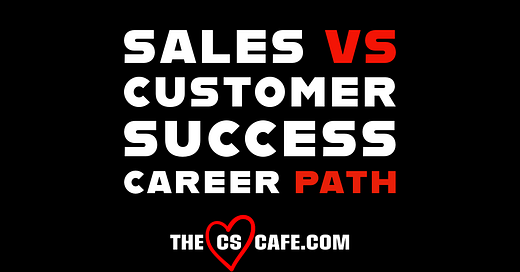The decision to choose between a career in sales or customer success can be a complex one.
Both jobs offer chances to grow and feel fulfilled, but they also come with different challenges and duties.
Here are the key reasons why you may choose one path over the other, and the key differences between the two roles:
About Sales
A career in sales can be incredibly rewarding for those who thrive in a fast-paced, competitive environment.
Sales professionals are responsible for driving revenue by persuading potential customers to purchase a company's products or services.
They use their expertise to identify client needs, present adapted solutions, and build strong relationships to close deals successfully.
Through strategic communication and negotiation skills, sales professionals contribute significantly to the growth and profitability of the organization.
This role often involves a significant amount of pressure, as sales targets are typically set high and must be met on a consistent basis.
However, the potential for earning a lot of money and the thrill of closing a deal can make sales an attractive career choice for many individuals.
For more insights on sales strategies, check out my Engaging Product Demos Tips.
The Appeal of Customer Success
On the other hand, customer success is a role that focuses on ensuring customer satisfaction and retention.
Customer success professionals are responsible for helping customers understand the value of a company's products or services and ensuring that their needs are met throughout the entire customer relationship.
This role often involves a more collaborative and relationship-building approach, as customer success teams work closely with customers to ensure their long-term success with the product or service.
To learn more about effective customer success strategies, see my Customer Success Fundamentals and Strategies.
The Differences Between Sales and Customer Success
While both sales and customer success roles involve interacting with customers at different stages of their journey, they differ in their primary objectives and the stages of the customer journey they focus on.
Sales teams are responsible for bringing in new customers by addressing their pain points and convincing them to make a purchase.
Once the sale is made, customer success teams take over, ensuring that customers are properly onboarded and that their needs are met throughout the entire customer relationship.
For a deeper dive into the customer journey, explore my Customer Success Processes for Startups.
The Similarities Between Sales and Customer Success
Despite their differences, sales and customer success teams share several key similarities.
Both departments interact with customers at different stages of their journey, and both teams work towards the same goal of increasing revenue for the company.
Additionally, both roles can engage in cross-selling and upselling, which can lead to additional revenue generation for the company.
For tips on boosting customer engagement, read my Customer Engagement Tactics.
And That’s It
The decision to choose between a career in sales or customer success is a personal one that depends on an individual's strengths, interests, and long-term goals.
Both roles offer unique opportunities for growth and fulfillment, and each comes with its own set of challenges and rewards.
Ultimately, the key is to find a role that aligns with your passions and values, and that provides you with the opportunity to make a meaningful impact on the lives of customers and the success of the company.
For more insights on customer success, check out my list of Best Courses for Customer Success Experience and read more about Scaling Customer Success: The Ultimate Guide.






